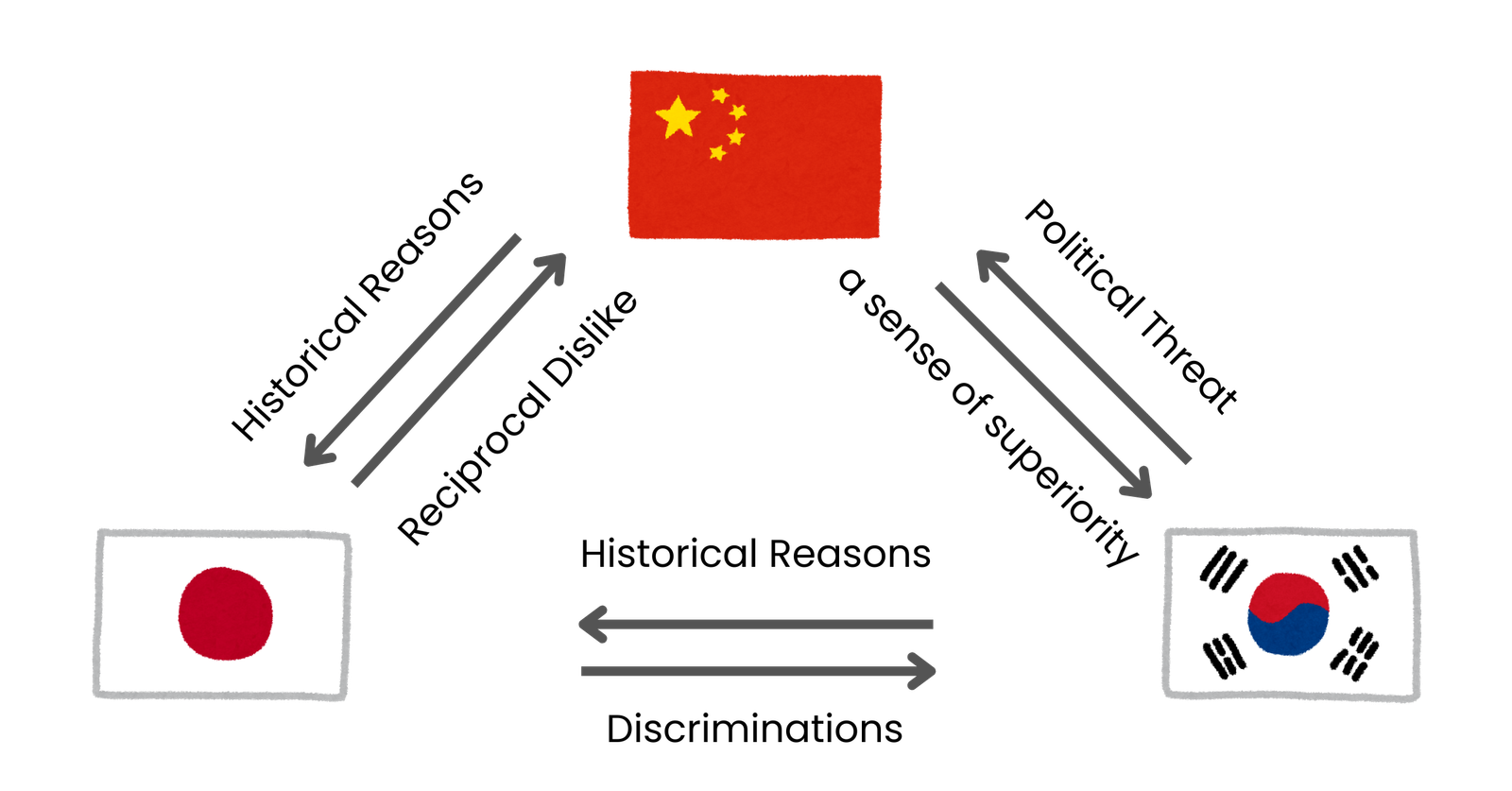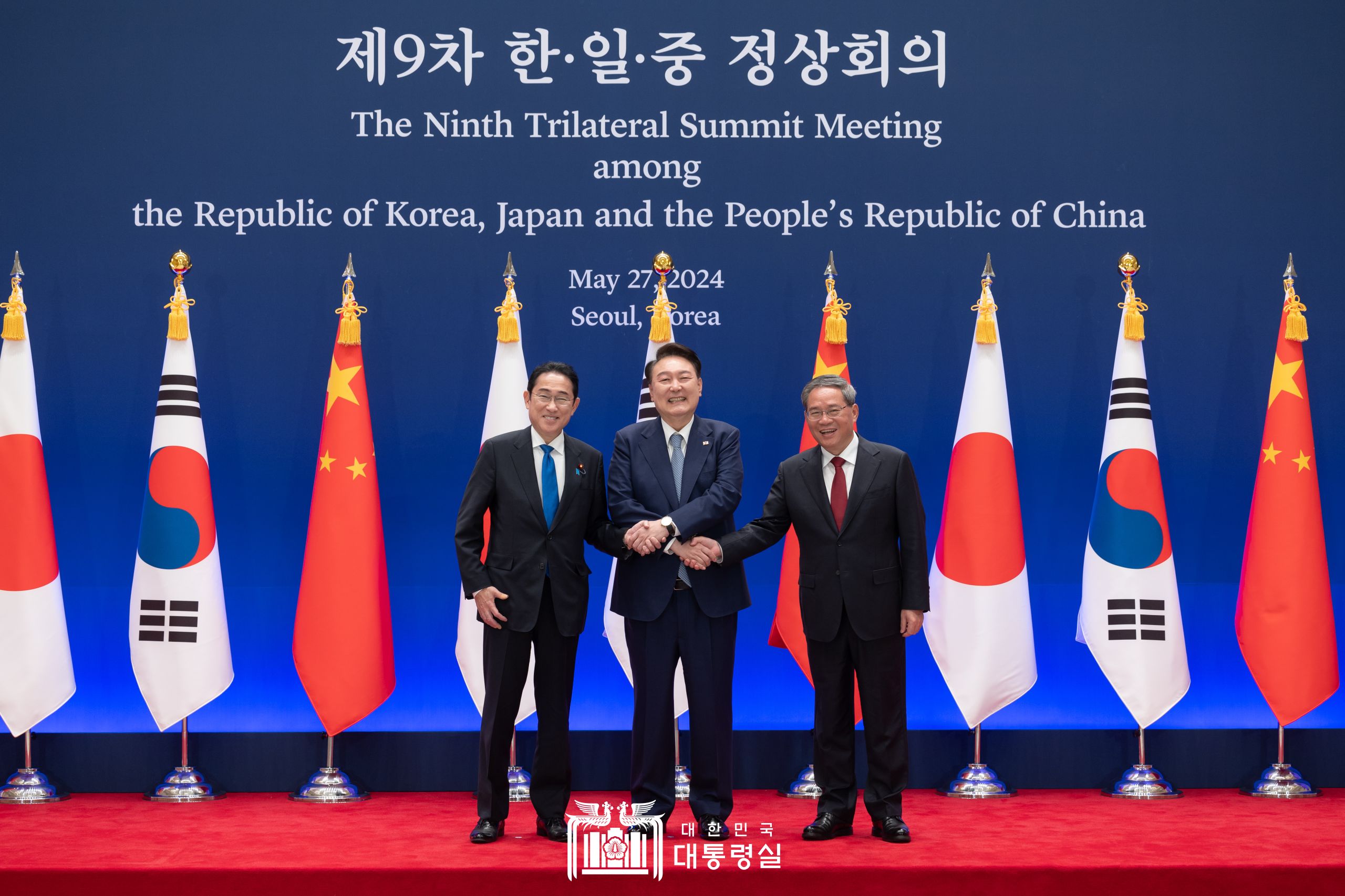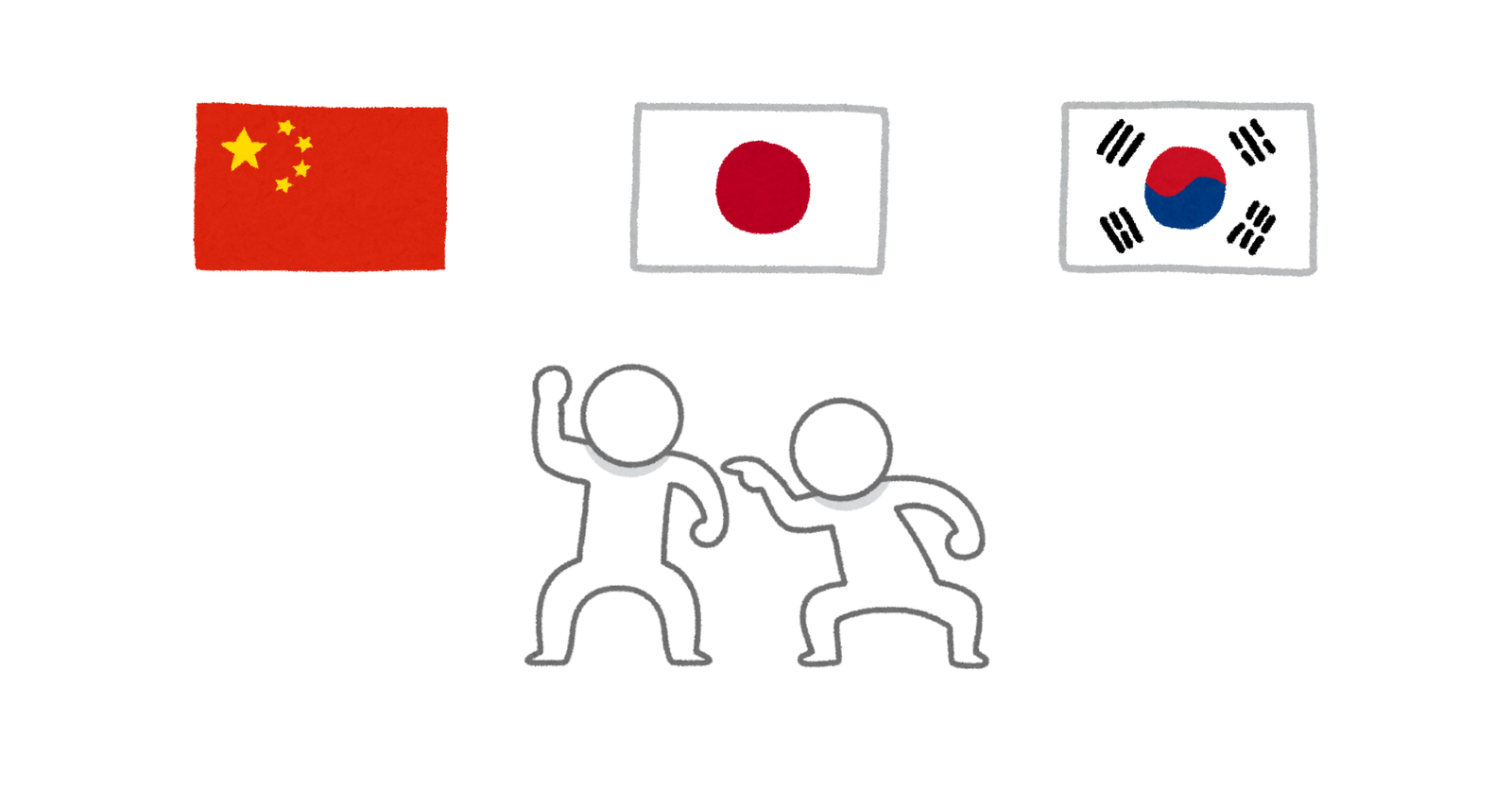You may have noticed that Chinese, Japanese, and Korean people often argue with each other online or that there are occasional campaigns in one country against another.
Why is this the case? These three countries share many cultural similarities and are often considered part of the same East Asian cultural sphere. It would seem natural for them to be friendly with one another, right? Well, not exactly.
Despite strong economic ties and significant immigration between them, relations among China, Japan, and South Korea remain strained at both the governmental and societal levels.

1. How Strong Are These Negative Sentiments?
Let’s start by examining how much these three countries dislike each other.
Regarding perceptions of China, a 2023 report by the Pew Research Center found that 87% of Japanese people and 77% of South Koreans held unfavorable views toward China.
As for Japan, a 2023 Asahi Shimbun survey indicated that 53.3% of South Koreans had a negative impression of Japan. A 2024 Asahi Shimbun report showed that nearly 88% of Chinese respondents viewed Japan unfavorably.
When it comes to South Korea, recent polls are scarce, but it’s widely recognized that a significant portion of people in both China and Japan hold negative views of South Korea. This is an undeniable reality.
2. Why Do China and Korea Dislike Japan?
The animosity that China and Korea feel toward Japan stems from similar historical experiences. The primary reason lies in Japan’s invasions and occupations of both countries during World War II.
In China, large areas of the country—including the capital, Nanjing—were occupied by Japan. Japan established a puppet government in Manchuria and was responsible for the deaths of 35.87 million Chinese people, including the atrocities committed during the Nanjing Massacre.

In Korea, Japan occupied the entire peninsula, resulting in over 1 million deaths and the forced conscription of 8.4 million Koreans to fight for Japan.
The scars of these historical events remain deeply ingrained in both Chinese and Korean societies, turning them into highly sensitive political issues. When Japan seeks to expand its military, China and Korea frequently voice strong opposition, asserting that Japan has yet to fully confront or atone for its wartime actions.
This kind of tension escalates, particularly when Japanese leaders with right-wing affiliations visit Yasukuni Shrine—a site controversial for enshrining war criminals. Notably, the Japanese imperial family has refrained from visiting the shrine since the end of WWII, underscoring the delicate nature of the issue.
Beyond historical grievances, there are also ongoing territorial disputes. China and Japan are at odds over the Diaoyu Islands (known as Senkaku Islands in Japan), located in the East China Sea. In 2012, tensions flared, leading to large-scale protests in China against Japan’s territorial claims and products. Korea and Japan dispute sovereignty over an island known as Dokdo in Korea and Takeshima in Japan.

3. Why Do Japan and Korea Dislike China?
Japan and Korea’s attitudes towards China share several similarities. The main reasons for this sentiment can be summarized as follows:
Political Differences – From the perspectives of Japan and Korea, China is seen as an authoritarian state, which poses a challenge to their democratic values. This ideological divide fosters distrust and concern.
Territorial Disputes – Both Japan and Korea have ongoing territorial conflicts with China. For Korea, this involves the Suyan Islet, while for Japan, it revolves around the Diaoyu Islands as mentioned earlier. China’s large size and military strength amplify the perceived threat to both nations.
Immigration Issues – The significant number of Chinese visitors and residents in Japan and Korea can feel overwhelming to local populations, contributing to social and cultural friction.
Mutual Resentment – In Korea’s case, a portion of the negative sentiment towards China stems from perceived arrogance or cultural superiority among Chinese people. Historically, Korea was part of China’s tributary system, and as Korean nationalism grows, there is an effort to distance itself from Chinese influence—for example, advocating for the term “Lunar New Year” instead of “Chinese New Year.” Such cultural push often leads to heated debates between the two countries. In Japan’s case, historical conflicts and the perception that Chinese people harbor strong anti-Japanese sentiments create a reciprocal dislike among Japanese citizens.
4. Why Do China and Japan Dislike Korea?
The reasons for the negative sentiments in China and Japan towards Korea are somewhat different today.
For China, as mentioned earlier, Chinese people have historically seen themselves as the cultural sovereign of Korea, which can lead to a sense of superiority over Korea and its people. In recent years, actions taken by Korea have fueled negative feelings among the Chinese.
For example, China perceives Korea’s efforts to claim certain cultural heritages as Korean, which are viewed by many Chinese as historically belonging to China. In addition, Korea has made claims over various items and traditions that China believes originated there, further exacerbating tensions.
For Japan, the situation is more complex. While younger generations in Japan tend to have positive opinions of Korea, largely due to the popularity of K-pop and Korean culture, older generations still harbor negative sentiments toward Korea. This is largely due to historical conflicts and the lingering effects of past discrimination, which continue to influence perceptions.
5. Future Prospects
Although China, Korea, and Japan have complex and sometimes strained relations, these three countries are crucial to each other in terms of economic, political, and cultural ties. For instance, according to the National Bureau of Statistics of China, Japan and Korea are respectively China’s second and third largest trade partners, while China is the largest trading partner for both Japan and Korea.
China, Japan, and Korea hold periodic trilateral summits to promote discussions and strengthen cooperation. Cultural exchanges between the three countries are also growing, with more students being sent to study in each other’s countries.

A positive future for the three nations depends on overcoming historical burdens through open dialogue and focusing on shared goals. By strengthening cooperation in areas like technology and environmental efforts, they can build a more stable and prosperous region together.


